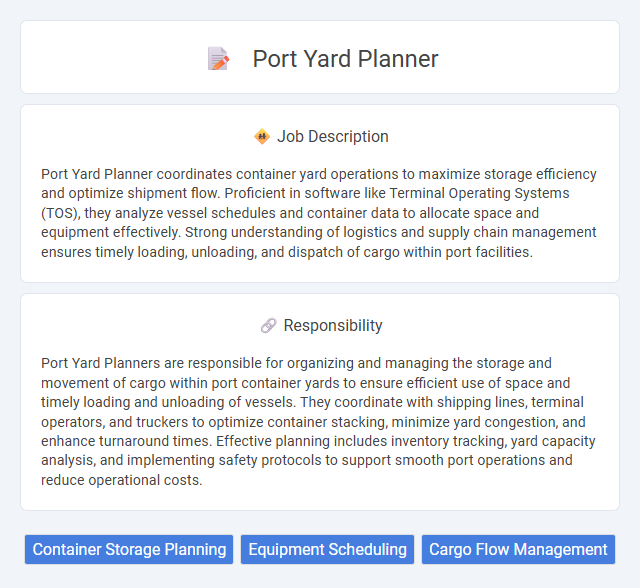
Port Yard Planner coordinates container yard operations to maximize storage efficiency and optimize shipment flow. Proficient in software like Terminal Operating Systems (TOS), they analyze vessel schedules and container data to allocate space and equipment effectively. Strong understanding of logistics and supply chain management ensures timely loading, unloading, and dispatch of cargo within port facilities.
Individuals who are detail-oriented and possess strong organizational skills are likely to be well-suited for a Port Yard Planner role. Candidates with the ability to manage logistics efficiently and adapt to dynamic work environments may find this job fitting to their strengths. Those who thrive under pressure and have good communication abilities probably have a higher probability of succeeding in this position.
Qualification
A Port Yard Planner requires a strong background in logistics, supply chain management, or industrial engineering, typically supported by a bachelor's degree in a related field. Proficiency in port operations software, advanced skills in data analysis, and knowledge of container handling processes are essential to optimize yard space and improve cargo flow. Effective communication and problem-solving abilities enable coordination with multiple stakeholders, ensuring efficient planning and execution within dynamic port environments.
Responsibility
Port Yard Planners are responsible for organizing and managing the storage and movement of cargo within port container yards to ensure efficient use of space and timely loading and unloading of vessels. They coordinate with shipping lines, terminal operators, and truckers to optimize container stacking, minimize yard congestion, and enhance turnaround times. Effective planning includes inventory tracking, yard capacity analysis, and implementing safety protocols to support smooth port operations and reduce operational costs.
Benefit
Port Yard Planners likely enhance operational efficiency by optimizing cargo storage and movement within port yards, which can reduce handling times and increase throughput. Improved resource allocation and better space utilization may lead to cost savings and higher productivity for port operations. There is a probability that these benefits contribute to smoother logistics flow and stronger supply chain reliability.
Challenge
The Port Yard Planner job likely presents significant challenges related to coordinating complex logistics within tight timeframes while managing limited space and resources. Effective problem-solving skills are probably essential to optimize yard operations and prevent bottlenecks. There is a strong probability that adapting to unpredictable incoming shipments and equipment availability will test planners' ability to maintain smooth port flow.
Career Advancement
Port Yard Planner roles offer significant career advancement opportunities through mastery of logistics optimization, inventory management, and shipping coordination. Professionals gain expertise in utilizing advanced software systems and data analytics to streamline port operations, enhancing efficiency and decision-making skills. Progression often leads to senior management positions such as logistics manager or operations director within the maritime and supply chain sectors.
Key Terms
Container Storage Planning
Port Yard Planners optimize container storage to maximize space utilization and streamline cargo handling in busy port terminals. They use advanced software tools for tracking container locations, scheduling timely movements, and ensuring compliance with safety standards. Effective container storage planning reduces congestion, minimizes equipment idle time, and supports efficient intermodal transfers.
Equipment Scheduling
Port Yard Planners manage equipment scheduling to optimize the allocation of cranes, forklifts, and trucks for efficient cargo handling in busy ports. They use advanced software systems and real-time data analytics to coordinate equipment availability, minimizing delays and maximizing operational throughput. Precise equipment scheduling reduces bottlenecks, enhances safety, and supports seamless container movement from ship to yard.
Cargo Flow Management
Port Yard Planners specialize in optimizing cargo flow management by coordinating the movement, storage, and distribution of containers within port yards to maximize operational efficiency. They utilize advanced software systems and real-time data analysis to monitor container statuses, minimize dwell times, and streamline loading and unloading processes. Effective cargo flow management reduces congestion, improves turnaround times, and supports seamless supply chain operations in busy maritime logistics hubs.
 kuljobs.com
kuljobs.com